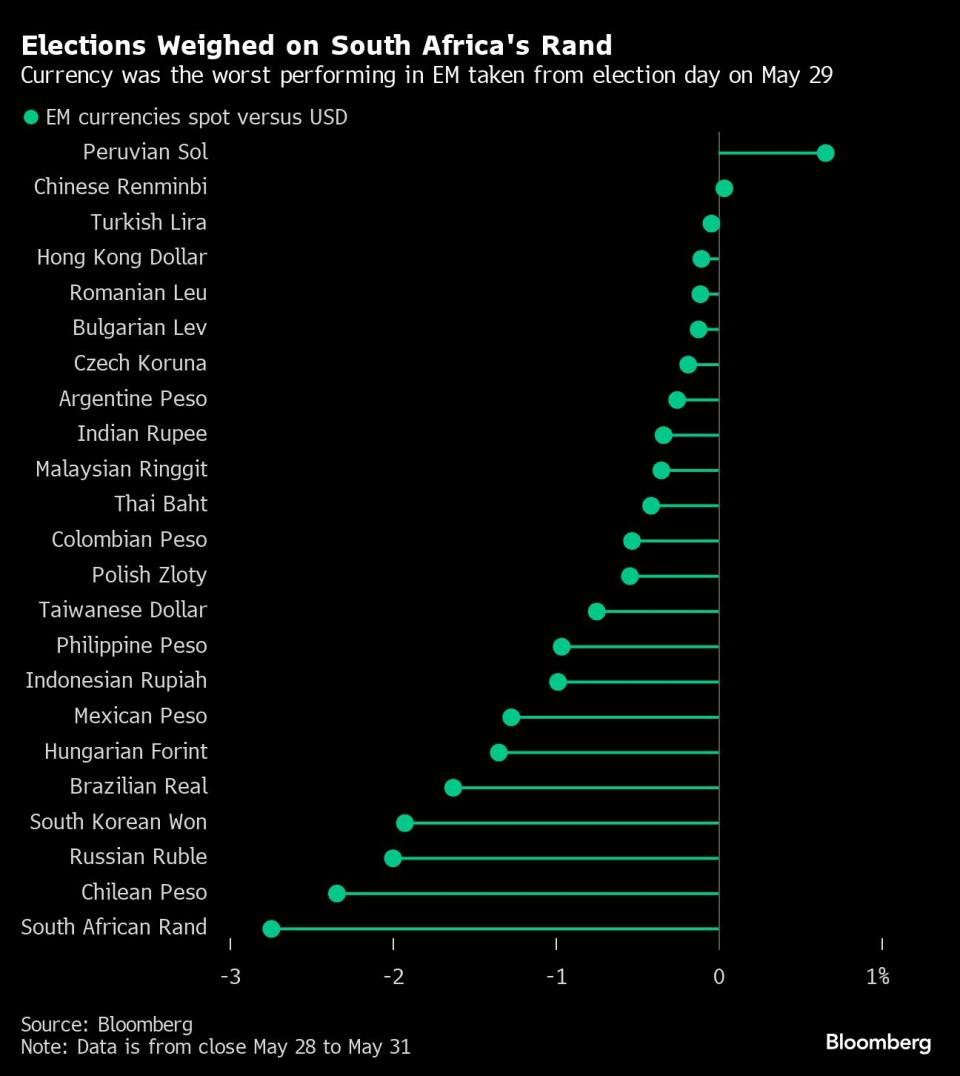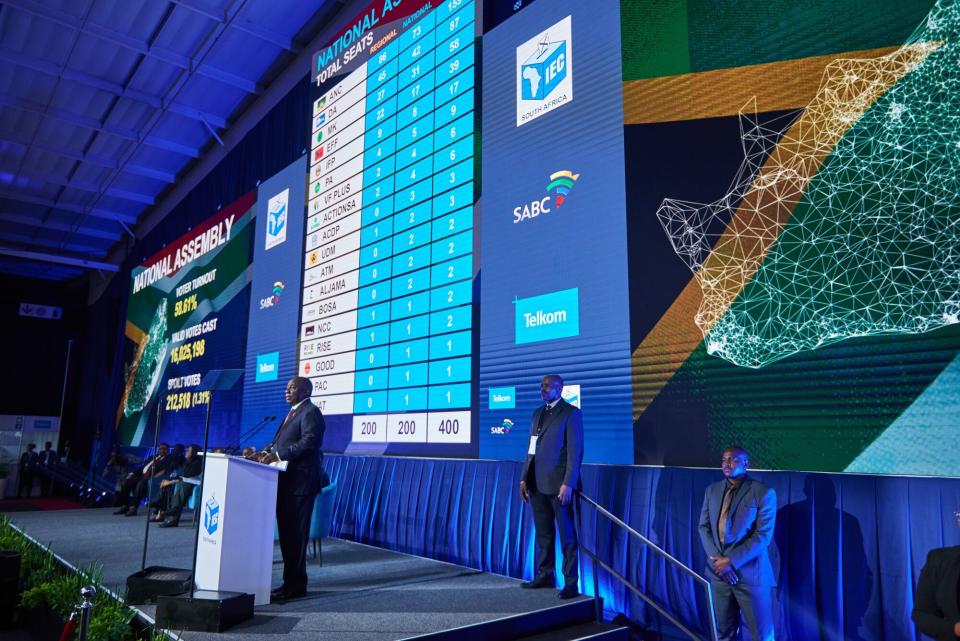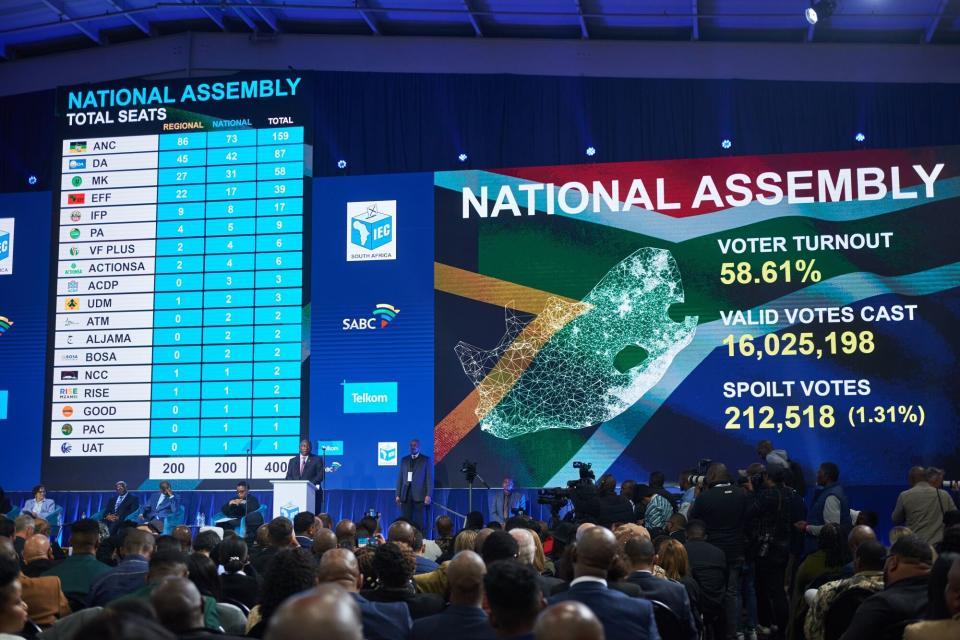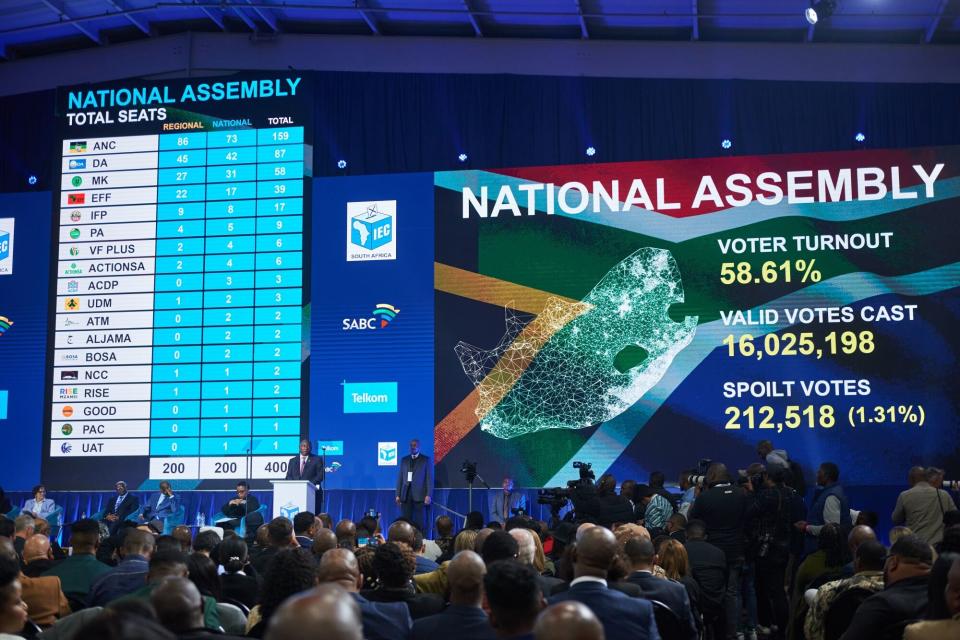South Africa’s Political Flux Leaves Investors on Tenterhooks
(Bloomberg) -- Investors braced for further upheaval in South Africa’s financial markets in the wake of elections that produced no outright winner, with the outcome of coalition talks and future policy direction remaining highly uncertain.
Most Read from Bloomberg
Key Engines of US Consumer Spending Are Losing Steam All at Once
GameStop Shares Surge as Gill’s Reddit Return Shows Huge Bet
Mnuchin Chases Wall Street Glory With His War Chest of Foreign Money
Homebuyers Are Starting to Revolt Over Steep Prices Across US
AMLO Protege Sheinbaum Becomes First Female President in Mexico
Rand volatility over the next month jumped Monday, briefly touching September highs. The rand traded 0.3% stronger by 11:53 a.m. In Johannesburg at 18.7375 per US dollar. If the performance holds, this will be the currency’s first day of gains in four. Yields on benchmark local-currency debt fell nine basis points to 12.1% and stocks snapped four days of losses, climbing by the most in a day in nearly a month.
The African National Congress fell short of a parliamentary majority for the first time since taking power under Nelson Mandela in 1994, as its supporters voiced anger about poverty, unemployment and crime by boycotting the polls or backing rivals. It must now rely on at least one other big party to retain power, and its choice of partner will shape the country’s path over the next five years with repercussions for citizens, businesses and investors alike.
The ANC garnered 40.2% of the votes cast on May 29. The centrist Democratic Alliance got 21.8%, former President Jacob Zuma’s new uMkhonto weSizwe Party, or MKP, 14.6% and the leftist Economic Freedom Fighters 9.5%.
The latter two parties, which both splintered from the ANC, favor increased state spending and the nationalization of mines and the central bank. The prospects of them joining the government and demanding populist policy changes is weighing on South African assets.
“Investors should be very worried because South Africa is at a fork in the road,” said Anne Frühauf, the managing director of risk adviser Teneo. “Right now, almost any coalition outcome is possible.”
The rand has slipped 2.6% against the dollar since voting began on May 29 as the extent of the ANC’s losses became apparent. The cost of insuring the nation’s debt has risen by about 19 basis points in that time to 242.3 basis points.
The ANC won’t be “reckless” in choosing a coalition partner, Finance Minister Enoch Godongwana said in a Bloomberg interview. “The ANC remains the biggest party and economic policy will remain ours and so there is no risk to stability or threat to investor confidence.”
A coalition with the Democratic Alliance would be the most market-positive, “but getting there won’t be easy and will undoubtedly exert pressure on ANC cohesion,” said Mark Bohlund, senior credit research analyst at REDD Intelligence. “I think the uncertainty will continue to weigh on the rand, with a record breach of 20 per US dollar a distinct possibility.”
While the leaders of the main parties met over the weekend to chart a way forward, they’ve yet to begin negotiating with each other in earnest and it will likely take several days before any agreement is struck. The National Assembly must meet to elect a president within 14 days of the declaration of the election results, although the law provides for an extension if no candidate can be agreed.
All the main parties have said they are open to a deal, although Zuma’s MKP has made any partnership with the ANC contingent on it ousting President Cyril Ramaphosa — a condition ANC Secretary-General Fikile Mbalula said it will never accept.
While Ramaphosa’s allies favor a coalition with the DA, that option will encounter opposition within the ANC’s ranks, according to people with knowledge of the situation. The ANC is considering a range of options to work with rivals, including a possibility it may agreed to appoint a finance minister from outside the party, other insiders said. The president can appoint two people to cabinet who aren’t members of parliament.
Read more: South Africa’s ANC Courts Rivals After Election Humiliation
“While opposition parties like the DA, MK and EFF will push hard to secure a deal, equally important will be the ANC’s internal dynamics,” Frühauf said. “This could be a big internal fight.”
The DA agreed on Sunday to initiate exploratory talks with rivals to avoid what it refers to as a “doomsday coalition” grouping the ANC with Zuma’s party and the EFF.
DA leaders are leaning toward seeking a formal coalition with the ANC in which they would receive some cabinet posts and control of several parliamentary portfolio committees. Some DA leaders oppose the idea, the people said, and a decision has yet to be taken.
EFF leader Julius Malema, who established the party in 2013 after he was expelled from the ANC, said he’s open to cooperating with it.
Zuma’s allegation the vote count was marred remains a concern. While the electoral commission said the vote was clean and fair, his claim could spark unrest, particularly in the eastern KwaZulu-Natal province where the MKP won almost half the vote.
Zuma served for almost nine scandal-marred years as president before the ANC forced him to step down. His arrest for refusing to testify before a graft inquiry sparked the worst rioting and looting the country has seen since the end of apartheid, claiming the lives of 354 people.
Sign up here for the twice-weekly Next Africa newsletter.
--With assistance from Ntando Thukwana, Amogelang Mbatha and Paul Richardson.
Most Read from Bloomberg Businessweek
Disney Is Banking On Sequels to Help Get Pixar Back on Track
The Budget Geeks Who Helped Solve an American Economic Puzzle
Israel Seeks Underground Secrets by Tracking Cosmic Particles
How Rage, Boredom and WallStreetBets Created a New Generation of Young American Traders
©2024 Bloomberg L.P.





